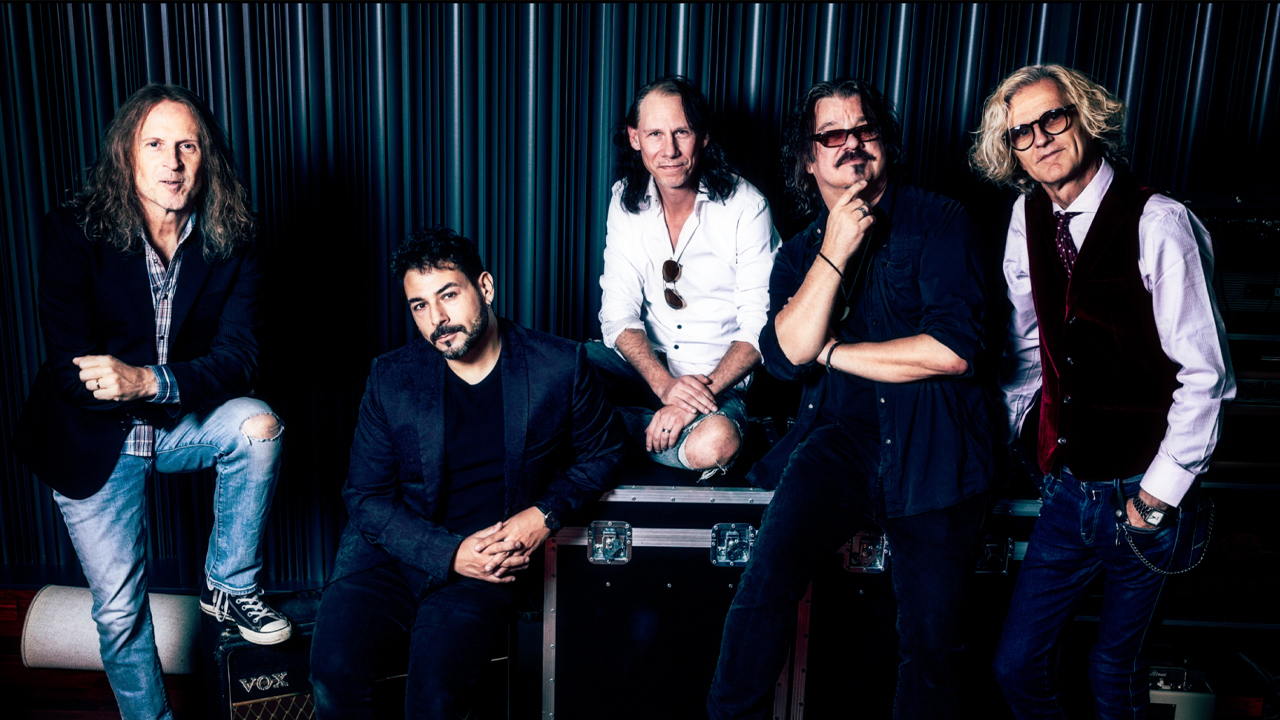“I even received death threats – ‘Communist Swede, you think you’re so fantastic. Come to America!’ I’ve been there; the way it’s going now is not good”: If the new Flower Kings album offends you, Roine Stolt can live with that
The band’s 13th album, titled simply Love, may or may not contain some political points, but it does contain more examples of the music their leader has loved to create for over five decades

Select the newsletters you’d like to receive. Then, add your email to sign up.
You are now subscribed
Your newsletter sign-up was successful
Want to add more newsletters?

Every Friday
Louder
Louder’s weekly newsletter is jam-packed with the team’s personal highlights from the last seven days, including features, breaking news, reviews and tons of juicy exclusives from the world of alternative music.

Every Friday
Classic Rock
The Classic Rock newsletter is an essential read for the discerning rock fan. Every week we bring you the news, reviews and the very best features and interviews from our extensive archive. Written by rock fans for rock fans.

Every Friday
Metal Hammer
For the last four decades Metal Hammer has been the world’s greatest metal magazine. Created by metalheads for metalheads, ‘Hammer takes you behind the scenes, closer to the action, and nearer to the bands that you love the most.

Every Friday
Prog
The Prog newsletter brings you the very best of Prog Magazine and our website, every Friday. We'll deliver you the very latest news from the Prog universe, informative features and archive material from Prog’s impressive vault.
A tale of death threats, accusations of being a Communist and the importance of Love: Roine Stolt talks about resisting formulas, looking beyond the boundaries of prog, and why he won’t compromise his creative vision with The Flower Kings.
There aren’t many musicians whose lives have been defined by music as completely as Roine Stolt’s. He joined Swedish prog flagbearers Kaipa aged just 17 and five decades later, he remains one of the genre’s most prolific composers and collaborators.
He recently tapped into the zeitgeist with Love, the 17th studio album from The Flower Kings, whom he founded in 1994. And for the bandleader, creating it has been his life’s calling.
“I just enjoy being in the zone,” he says. “At a younger age I was also painting, and I was going to go to art school, but then I was picked up by a band and we were playing 150 shows a year. So that became my profession, and I forgot about art school.”
With a career spanning over 50 years, he could be forgiven for resting on his laurels. The surviving artists who built progressive rock in the 1960s and 70s are either retiring or trying to finish as much work as possible while they still can.
“I maybe view it in a little bit of a different way,” Stolt says about the passing of the years. “Someone sent me a discography of recordings I’ve done. I started when I was 18 on my first album, and since then I think I’ve recorded 250 records. Even the guys in Yes and Genesis haven’t recorded that much!”
The catalogue spans Kaipa, The Flower Kings, The Tangent, Karmakanic, Agents Of Mercy, The Sea Within, Transatlantic and a joint album with Jon Anderson. It’s a body of work anyone would be proud of – but is it sufficient for someone consumed by the urge to compose?
Sign up below to get the latest from Prog, plus exclusive special offers, direct to your inbox!
“Yeah, it’s enough,” says Stolt, “but I’m not saying I’m going to stop, because I enjoy recording. I enjoy writing songs. It’s not like I feel time running out in a dramatic way: ‘Oh, I need to write my last songs!’ I could be dead tomorrow, I might live 30 more years. I’ll keep on writing songs and recording and playing.
“I’m pretty happy where I am at the moment – I can still sit down by the piano and write songs and something new comes up. It doesn’t have to be the greatest song ever written; not a new Bohemian Rhapsody. I would love to, but that’s not what I’m looking for. I’m just looking to entertain myself and then I hope other people will be entertained too.”
Asked to describe the essence of The Flower Kings’ sound, he highlights a “strong element of melody,” adding: “There’s some element of Swedish folk music, some element of classical music, some element – not really of jazz, but more like fusion or a jam band thing.” For Stolt, it’s a balancing act between what the audience desires, where his bandmates are at musically, and what the record label needs to make a profit.
“I think it’s finding the right balance with being commercial. We want to sell albums, we want to go out and play to bigger audiences all the time – but I wouldn’t let my artistic vision suffer to do it.
“I think we’re unpredictable in The Flower Kings, whereas I can see with other bands on our label – Haken, Dream Theater, Spock’s Beard – that it’s more of a formula; you know what you get. With The Flower Kings, you don’t know what you get. It can be a challenge for the listener. We take the risk of people maybe not liking it: ‘I like Last Minute On Earth; why don’t you write more songs like that?’ I could never do that. I could never go back and just write a song to please them.”
You see countries having this love affair with fascist parties. You keep your fingers crossed that it’s not going that way again
Rather than looking to bands within his genre for inspiration, Stolt finds ideas further afield. “I’ve been listening to so much music that isn’t really progressive rock and it’s not rock’n’roll. I’ve taken bits and pieces of whatever I’ve heard over the years. It doesn’t matter if it’s Hungarian music or Japanese music, American country music or Swedish folk music; I put it in and we do it in The Flower Kings way with the instrumentation that we have. That makes us stand out a little bit.”
In a time of war in Europe and the Middle East, and political turbulence in the US, an album that loudly declares the importance of love seems like a political statement. Stolt says that’s up to the listener – not that he’s any stranger to receiving a backlash against what he’s written.
“At times I have been a little bit political and I’ve been put down,” he says. “People say, ‘I’m going to stop listening to your fucking Communist records!’ I even received death threats in Sweden. They say, ‘Communist Swede, you think you’re so fantastic. Come to America and you’ll see what we mean!’
“I’ve been to America many, many times and I’ve seen what’s good and what’s bad. The way it’s going now is not good. You see it in Europe: countries having this love affair with fascist parties. You just keep your fingers crossed that it’s not going that way. We’ve seen it 70, 80 years ago. God forbid it’s going that way again.”
The songs on Love include lyrics such as, ‘If we could bury hate, there’s nothing greater than the love we save’ in The Elder. The song Love Is includes: ‘Way too many didn’t heed the warnings as hate moves fast from door to door.’ It’s hard not to see that as a commentary on the rise of the far right.
‘I listened to the Flower Kings – they’re Communists from Sweden!’ They’re wrong, but what can I say?
“I wouldn’t say it’s a political album, but I can’t deny that’s what’s creeping in and where the world is going. It’s for each and every one to do whatever they want; if they’re offended, I have no problem with that – there are so many other bands they can listen to.
“‘I listened to this new Flower Kings and they’re fucking Communists from Sweden!’ They’re wrong, but what can I say? It is what it is. I see no other way of doing music. This is what we do.”
In the 1960s there was a sense that music could change the world for the better. It’s easy to be cynical, but The Flower Kings might have a point: in these uncertain times, perhaps Love is all we need. “I can see a small ray of light,” says Stolt. Long may it shine.
After starting his writing career covering the unforgiving world of MMA, David moved into music journalism at Rhythm magazine, interviewing legends of the drum kit including Ginger Baker and Neil Peart. A regular contributor to Prog, he’s written for Metal Hammer, The Blues, Country Music Magazine and more. The author of Chasing Dragons: An Introduction To The Martial Arts Film, David shares his thoughts on kung fu movies in essays and videos for 88 Films, Arrow Films, and Eureka Entertainment. He firmly believes Steely Dan’s Reelin’ In The Years is the tuniest tune ever tuned.





